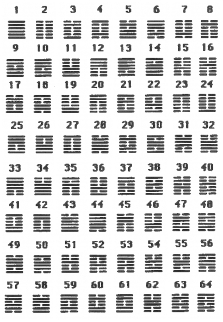
The Best Attitudes for 2023
From the I Ching
by Nori Muster
Like last year, floods and fires continue to batter our planet. In America we've learned from years of climate denial and domestic political violence how long cruelty and lies can continue without any apparent karmic reaction. Instead of dwelling on the negative, we can consult the I Ching for the most positive and appropriate attitudes for 2023.
The I Ching, Yi Jing, also known as the Book of Changes, is a collection of stories written in six lines (hexagrams). It came into being simultaneous with early Chinese writing, prior to 2000 BCE. Each hexagram addresses a different type of change, and the six lines in each hexagram describe the best or worst attitudes to flow with the changes.
To identify the best attitudes for 2023, we will examine three hexagrams:
Hexagram 12 - The Strong Trying to Obstruct the Weak
Hexagram 32 - Perseverance
Hexagram 61 - Higher Self
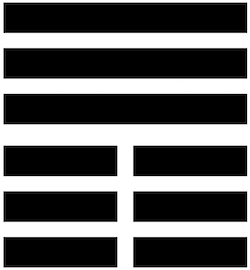
Hexagram 12 - The Strong Trying to Obstruct the Weak
The first line (yin) offers the metaphor of pulling up a clump of grass, bringing along other plants that were connected at the roots. This metaphor reminds us of how our actions affect others.
To begin to work on a problem, we need to understand the scope of the problem, including how much danger we face. Here, we live in a multicultural society, where we strive for liberty and justice for all. Still, we have politicians who don't see it that way. They act like they can just pull on people's roots and mess them up, without hurting the overall health of society. Current events have been damaging and demoralizing, posing real danger.
The second line (yin) shows a humble citizen who works hard and follows the rules. A powerful person could easily exploit such an honest person. The I Ching advises leaders to improve life for everyone, not just the privileged class.
The third line (yin) shows a leader who feels ashamed for taking advantage of ordinary citizens. To make things right, the leader must admit his mistakes, make amends, and become a better person - or look for a new vocation. We are fortunate to have many good politicians (now and in our history), but too many politicians these days are incapable of acknowledging their lies and mistakes.
The last three lines (all yang) show society balanced again after cruel leaders change their ways. In ancient times people had to just wait for the leaders to listen to the authority of the I Ching and become better leaders. History shows this could take lifetimes. Now we have elections to change our leaders out if they can't change. We have many capable candidates coming forward who care about human rights, civil rights, women's rights, and the earth.
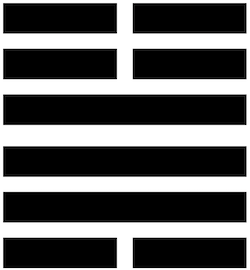
Hexagram 32 - Perseverance
While Hexagram 12 outlines the problem we face, Hexagram 32 offers advice on how to cope with it. The first line (yin) shows a person overwhelmed with stress from fighting the struggle for so long. Even though we haven't solved everything immediately, the best course is to turn toward the challenge and do the best we can.
Skipping to line 5 (yin), this hexagram offers further advice on how much stress we can handle. The metaphor is of "a careful woman married to an adventurous man." The adventurous man enjoys a good challenge, while a situation like this makes his careful wife nervous. The danger is he might try to draw her in too much, or she might try to hold him back. The message is to respect other people's process and ability to cope. We all need to go at our own pace.
The sixth line (yin) explains the role of small accomplishments. Pausing to celebrate success strengthens us for the long-term. Like recently, Congress got a new climate bill through, and although it's just one piece of the puzzle, it's worth celebrating. To stay positive, keep a mental list of all the good things happening (even though bad things happen too).
Line 6 says, "Once the crisis has passed, the leadership tries to keep up the mood of excitement. This will not increase production, but rather will bring misfortune" Keeping tension artificially high is cruel, and typical in a culture of tyranny where the leaders make people feel like every day could be the end of the world. Do not fall for it. If you feel good, take some time out to celebrate and replenish your determination.
The second line (yang) says "remaining balanced, the insecurity passes and the situation becomes more sure." This line reminds us we are working toward valuable idealistic goals: equality and justice. Even if we make just some progress, it will be worth it.
The remaining two lines point out the worst attitudes possible when it comes to building perseverance. The third line (yang) shows an angry person who stands on the sidelines making cynical comments that imply nothing can be accomplished. In the end, when things finally come around, this person might realize his opinions were unwelcome and unnecessary. Some people can only see a diminished future, known in the world of psychology as "foreshortened future." This is usually due to depression.
The fourth line (yang) shows someone "searching in a vacant field for game," in other words, someone who went off course. Perseverance means staying focused on the plan, not going off on tangents such as indulging in self-pity or picking fights.
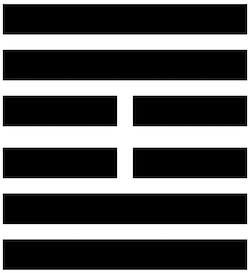
Hexagram 61 - Higher Self
Hexagram 61 explains the importance the I Ching puts on looking within oneself for guidance. The first line (yang) shows someone who concentrates on matters at hand, and is fully in touch with his or her inner thoughts and feelings.
The second line (yang) offers this metaphor: "a crane that finds shade in the reeds of a pond calls out to its young to come enjoy the shade." When we feel strong and at peace with the world, we can share our positive feelings with others. It's the opposite of trying to motivate each other by visualizing a frightening future.
The third line (yin) shows a sincere person who wants to find inner strength but is confused about history and current events, and only sees the obstacles to solving problems. The I Ching directs this person to spend more time getting in contact with an inner source of strength.
The fourth line (yin) shows someone who has made progress in life, who decides it's time to seek more fulfilling associations. The I Ching advises the person to move ahead on their own "with the full moon as a guide." The moon also refers to the light within.
If we change bad habits such as getting out of the drug world, or exiting an abusive cult or relationship, we may feel our friends from that world are holding us back. It is better to seek new associations and depend on our inner light and the moonlight to guide us.
The fifth line shows someone who gathers close associates. The enlightenment they share is joyful and increases their self-confidence. This is a positive way to meet the changes.
The sixth line (yang) shows the worst attitude. The metaphor is "a rooster trying to fly to heaven." If the I Ching is correct, and the truth lies within each person, then flapping one's wings like a rooster is useless. Bluster is the trademark of a charlatan. Even if people follow a cult leader and worship him, he can't lie his way into heaven, and he can't take others to heaven. Instead of following someone like this, or acting like this ourselves, it's better to do some honest introspection.
About the Author
Nori Muster is the author of Learning to Flow with the Dao: The 64 Hexagrams of the I Ching, and you can read your I Ching at her site, surrealist.org. She has a Master of Science degree from Western Oregon University and her thesis is on using artwork. Her first book, Betrayal of the Spirit, is a memoir of her ten years with the Hare Krishnas.
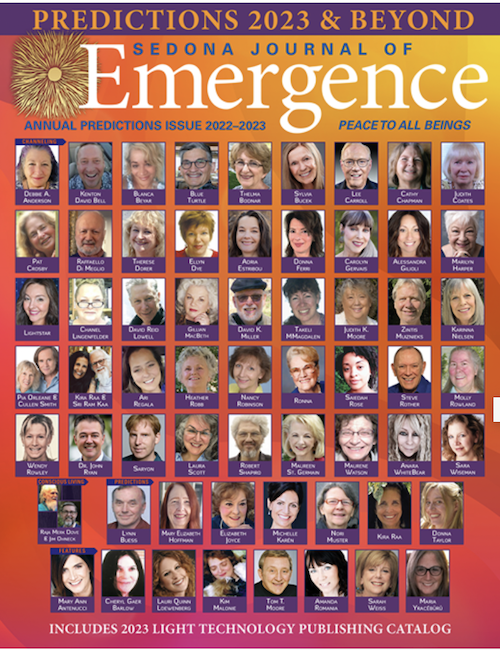
This essay originally appeared in Sedona Journal of Emergence, Predictions 2023 & Beyond, Annual Predictions Issue 2022-2023.
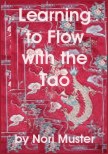
The 64 Hexagrams of the I Ching: Learning to Flow with the Tao
The I Ching is the ancient Taoist book of metaphors, written to offer guidance in the inevitable changes of life. The I Ching consists of sixty-four hexagrams, the number of combinations mathematically possible with six solid and broken lines. The broken lines "- -" are yin, or passive, dark, yielding. The solid lines are yang, active, light, reaching. Ancient Taoist scholars recorded meanings for each of the sixty-four combinations.
Your future is in your hands. Consult the I Ching for ideas that lead to clear thinking and positive mental attitude. The I Ching teaches you to flow with changes. Create positive change from the inside through conscious living. Take the time to reflect on your attitudes and ideas.
This interpretation of the ancient text I Ching has been online since 2000. Thousands of visitors have accessed the oracle through Surrealist.org. Now it is available at Amazon. Learn to flow with change instead of resist it.
Learning to Flow with the Dao (paperback or e-book) at Amazon.com - click here
I Ching reading (free) at Surrealist.org - click here.
Index